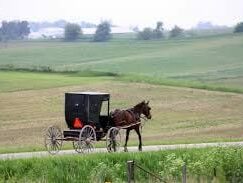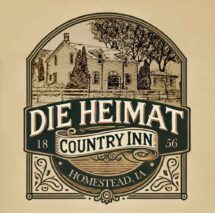Blog
The Amana Colonies & Kalona’s Old Order Amish – Part 2

TWO UNIQUE CULTURES IN SOUTHEAST IOWA –
THE AMANA COLONIES
The Inspirationists emerged in the early 1700's as part of the Pietist and Spiritualist movement within the Lutheran Church in Germany. Eberhard Gruber and Johann Friedrich Rock were early spiritual leaders in this Community of the True Inspirationists.
The Inspirationists placed a great deal of emphasis on the development and nurture of the Inner Life via direct mystical contact with God. A strong commitment to church discipline and close community relationships also characterized the Inspirationists.
In 1842, 800 German Inspirationists settled near Buffalo, New York, and began to practice full communal life institutionalizing precepts concerning dress and lifestyle. For economic and spiritual reasons, however, the group bought 18,000 acres in Iowa in 1854 and called their new home "Amana," a word taken from the Old Testament Song of Solomon, which means "to remain faithful".
In 1932, the year of the "Great Change," community of goods was discontinued. Strict regulations on dress and lifestyle have also been gradually eliminated. Church life itself, however, continues with its spiritualistic pattern and simple form of worship, in unadorned meetinghouses.
Despite the large number of visitors who come to the Amana villages each year, many unique cultural traditions remain and are, in fact, affirmed and passed on from generation to generation.
THE OLD ORDER AMISH
The Old Order Amish of Kalona represent a very different cultural-religious community with roots in the Anabaptist movement of the early 16th century. Jacob Ammann, an early leader of the group, established an Anabaptist church with a much more negative view of the "world" than that held by his spiritual cousins, the Mennonites.
The Old Order Amish are biblicists as opposed to spiritualists. They recognize the authority of God's Word as written down in the Bible and place less emphasis than do the Inspirationists on God's giving direct enlightenment to Christians through his Spirit.
In addition, the Amish come from Swiss ethnic stock and speak a completely different German dialect than members of the Amana Society.
But most importantly, the Old Order Amish maintain their theology and lifestyle intact, almost the way it was believed and put into practice 300 years ago. The Amish have experienced no "Great Change" in the 20th century. The Inspirationists in the Amana Colonies also continue to worship God in the same manner that they did 100 years ago. Theological changes are minimal. But whereas residents of the Amana Colonies dress in the latest fashions, outside of the Sunday morning services, the Old Order Amish maintain strict dress requirements and insist that no member use electricity or automobiles. There are no telephones in their homes.

TRADITION and INNOVATION
Thus, the Old Order Amish continue, almost unchanged, the cultural-religious traditions of their ancestors. The Inspirationists, on the other hand, have allowed some changes in their traditional beliefs and practices, at least outside church life itself. An example of this openness to change on the part of the Inspirationists is their acceptance of military service. The Amish remain strict pacifists, conscientious objectors to war.
Another major difference which historically separated the two groups was Amana's communal way of life. Though the Old Order Amish believe in mutual aid and assist one another in various ways (including the famous barnraisings), they never practiced community of goods. Also, whereas the Amana colonies early on established a variety of craft, appliance and furniture industries, which today are famous throughtout the world, the Old Order Amish have insisted that members stick to farming for the most part.
TWO PEOPLE, TWO UNIQUE CULTURAL TRADITIONS
Thus, Southeast Iowa has — in the Amana villages, and in the Kalona countryside — two very different, very unique religious-cultural groups, both with rich traditions, both extrememly interesting for visitors to interact with.
Isn't it interesting that today the descendents of the early Inspirationists and the progressive descendents of the Old Order Amish (many Mennonites in the Kalona area are descendents of the Old Order Amish families) compete with each other in athletic events (Amana High School versus either Iowa Mennointe School or Mid-Prairie High School).
No, do not expect to find any horses and buggies in the Amana Colonies. And no, the Old Order Amish do not make wine for public sale.
Each group has developed its own unique heritage. Both traditions enrich the lives of all who come into contact with them.
By Rod A. Janzen (1988) http://www.kalonaiowa.org/AmishAmana.htm

